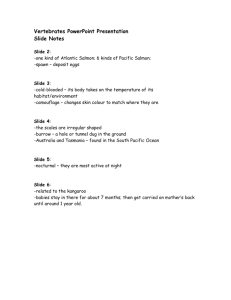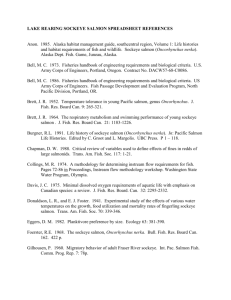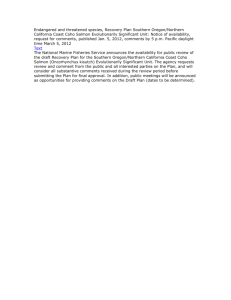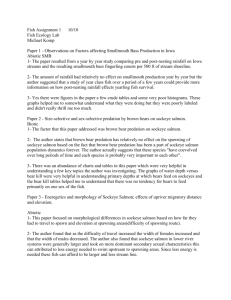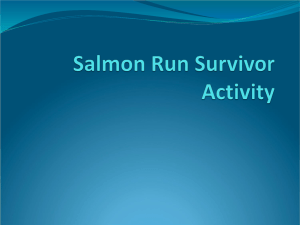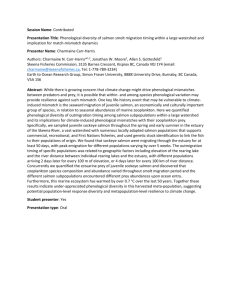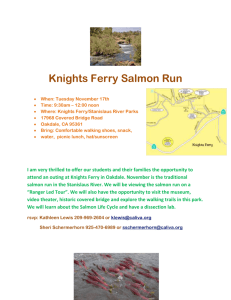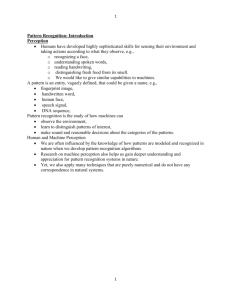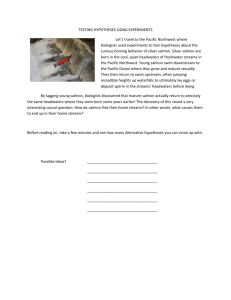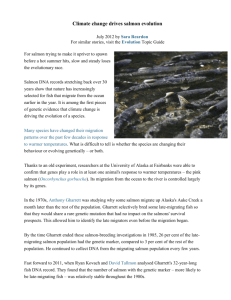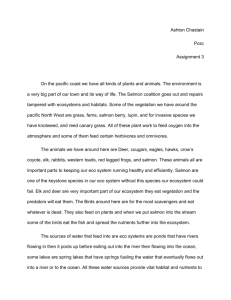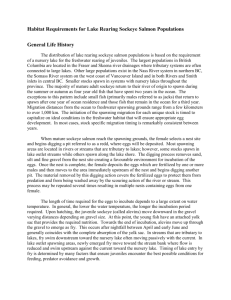LAKE REARING SOCKEYE SPREADSHEET REFERENCES
advertisement
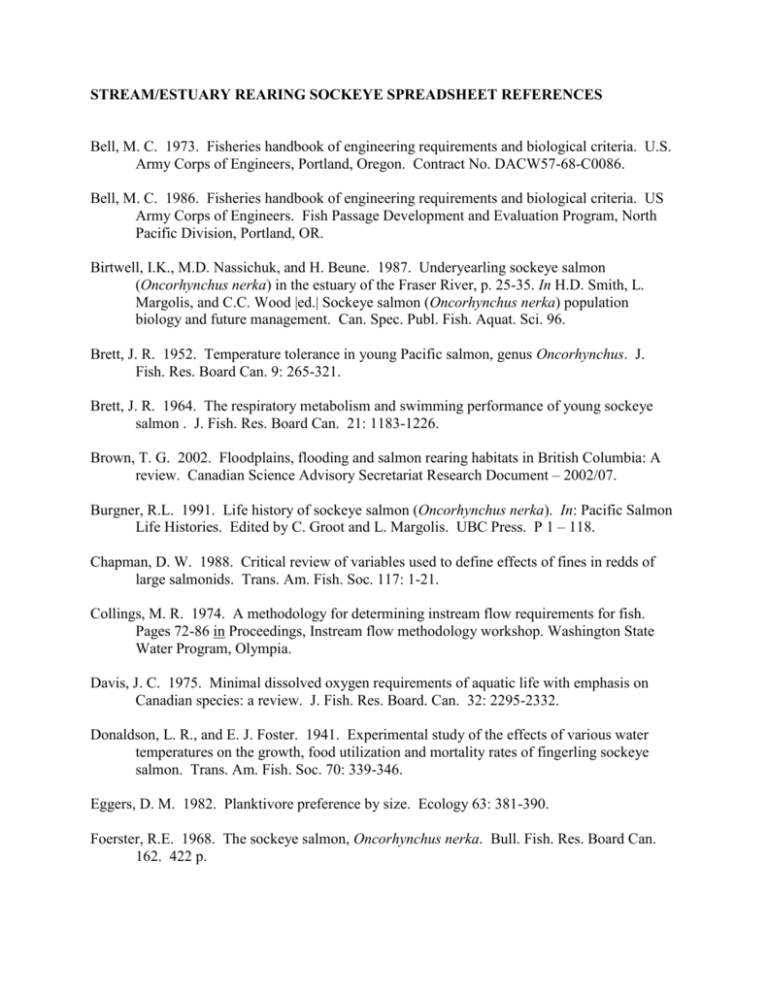
STREAM/ESTUARY REARING SOCKEYE SPREADSHEET REFERENCES Bell, M. C. 1973. Fisheries handbook of engineering requirements and biological criteria. U.S. Army Corps of Engineers, Portland, Oregon. Contract No. DACW57-68-C0086. Bell, M. C. 1986. Fisheries handbook of engineering requirements and biological criteria. US Army Corps of Engineers. Fish Passage Development and Evaluation Program, North Pacific Division, Portland, OR. Birtwell, I.K., M.D. Nassichuk, and H. Beune. 1987. Underyearling sockeye salmon (Oncorhynchus nerka) in the estuary of the Fraser River, p. 25-35. In H.D. Smith, L. Margolis, and C.C. Wood |ed.| Sockeye salmon (Oncorhynchus nerka) population biology and future management. Can. Spec. Publ. Fish. Aquat. Sci. 96. Brett, J. R. 1952. Temperature tolerance in young Pacific salmon, genus Oncorhynchus. J. Fish. Res. Board Can. 9: 265-321. Brett, J. R. 1964. The respiratory metabolism and swimming performance of young sockeye salmon . J. Fish. Res. Board Can. 21: 1183-1226. Brown, T. G. 2002. Floodplains, flooding and salmon rearing habitats in British Columbia: A review. Canadian Science Advisory Secretariat Research Document – 2002/07. Burgner, R.L. 1991. Life history of sockeye salmon (Oncorhynchus nerka). In: Pacific Salmon Life Histories. Edited by C. Groot and L. Margolis. UBC Press. P 1 – 118. Chapman, D. W. 1988. Critical review of variables used to define effects of fines in redds of large salmonids. Trans. Am. Fish. Soc. 117: 1-21. Collings, M. R. 1974. A methodology for determining instream flow requirements for fish. Pages 72-86 in Proceedings, Instream flow methodology workshop. Washington State Water Program, Olympia. Davis, J. C. 1975. Minimal dissolved oxygen requirements of aquatic life with emphasis on Canadian species: a review. J. Fish. Res. Board. Can. 32: 2295-2332. Donaldson, L. R., and E. J. Foster. 1941. Experimental study of the effects of various water temperatures on the growth, food utilization and mortality rates of fingerling sockeye salmon. Trans. Am. Fish. Soc. 70: 339-346. Eggers, D. M. 1982. Planktivore preference by size. Ecology 63: 381-390. Foerster, R.E. 1968. The sockeye salmon, Oncorhynchus nerka. Bull. Fish. Res. Board Can. 162. 422 p. Gilhousen, P. 1960. Migratory behavior of adult Fraser River sockeye. Int. Pac. Salmon Fish. Comm. Prog. Rep. 7: 78p. Kondolf, G. M. 2000. Assessing salmonid spawning gravel quality. Trans. Am. Fish. Soc. 129: 262-281. Lisle, T. E. 1989. Sediment transport and resulting deposition in spawning gravels, north central California. Water Resources Research 25 (6): 1303-1319. Lloyd, D.S. 1987. Turbidity as a water quality standard for salmonid habitats in Alaska. N. Amer. J. Fish. Manag. 7: 34-35. McCullough, D. 1999. A review and synthesis of effects of alterations to the water temperature regime on freshwater life stages of salmonids, with special reference to chinook salmon. Columbia Intertribal Fisheries Commission. EPA 910-R-99-010. Miller, R. J., and E. L. Brannon. 1982. The origin and development of life history patterns in Pacific salmonids. Pages 296-309 in E. L. Brannon and E. O. Salo, eds. Proceedings of the salmon and trout migratory behavior symposium. University of Washington Press. Seattle. Morrow, J. E. 1980. The freshwater fishes of Alaska. Anchorage, AK: Alaska Northwest Publishing Company. 248 p. National Marine Fisheries Service. 1996. Coastal salmon conservation: Working guidance for comprehensive salmon restoration initiatives on the Pacific coast. NMFS, Northwest Region, Seattle WA. 6p. Pauley, G.B., R. Risher, and G.L. Thomas. 1989. Species profiles: life histories and environmental requirements of coastal fishes and invertebrates (Pacific Northwest) – sockeye salmon. U.S. Fish. Wildl. Serv. Biol. Rep. 82(11.116). U.S. Corps of Engineers, TR EL-82-4. 22p. Quinn, T. P. 2005. The behaviour and ecology of Pacific salmon and trout. Univ. Wash. Press. 278p. Reiser, D. W., and T. C. Bjornn. 1979. Influences of forest and rangeland management on anadromous fish habitat in the western United States and Canada. 1. Habitat requirements of anadromous salmonids. U.S. Forest Serv. Gen Tech Rep. PNW- 96: 54p. Ruggerone, G. 2003. Rapid natural habitat degradation and consequences for sockeye salmon production in the Chignik Lakes system, Alaska. Prepared for the Chignik Regional Aquaculture Association and UW Aquatic and Fishery Sciences. SAFA-UW0309. Salo, E. O. 1991. Life history of chum salmon (Oncorhynchus keta). In: Pacific Salmon Life Histories. Edited by C. Groot and L. Margolis. UBC Press. P 232 – 309. Thompson, K. 1972. Determining stream flows for fish life. Pages 31-50 in Proceedings, instream flow requirements workshop. Pacific Northwest Rivers Basins Commission, Vancouver, Washington. Wood, C.C., B.E. Riddell and D.T. Rutherford. 1987. Alternative juvenile life histories of sockeye salmon (Oncorhynchus nerka) and their contribution to production in the Stikine River, northern British Columbia. P. 12-24. In. H.D. Smith, L. Margolis and C.C. Wood |ed.| Sockeye salmon (Oncorhynchus nerka) population biology and future management. Can. Spec. Publ. Fish. Aquat. Sci. 96. Zimmerman, A. E., and M. LaPointe. 2005. Intergranular flow velocity through salmonid redds: sensitivity to fines infiltration from low intensity sediment transport events. River Res. Applic. 21: 865-881.
